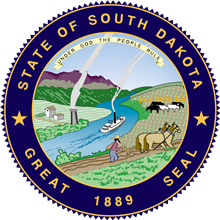October 2, 2018 •
South Dakotans to Vote on Ethics this November
South Dakotans will have multiple ethics-related ballot measures to vote on this November. Constitutional Amendment W, also known as the South Dakota Voter Protection and Anti-Corruption Amendment, would create an independent ethics commission, decrease limits on campaign donations, bar gifts […]
 South Dakotans will have multiple ethics-related ballot measures to vote on this November.
South Dakotans will have multiple ethics-related ballot measures to vote on this November.
Constitutional Amendment W, also known as the South Dakota Voter Protection and Anti-Corruption Amendment, would create an independent ethics commission, decrease limits on campaign donations, bar gifts from lobbyists to many public officials, and prevent the Legislature from altering or rejecting laws approved by ballot question without returning to the ballot.
More than 51 percent of voters supported a similar initiative in November 2016, but lawmakers repealed it in early 2017, citing constitutional concerns.
Also on the November ballot, Initiated Measure 24, would prohibit contributions to ballot question committees by non-residents, out-of-state political committees, and entities who have not filed with the secretary of state for the four years prior to making a contribution.
On December 29, South Dakota Secretary of State Shantel Krebs certified the South Dakota Voter Protection and Anti-Corruption Amendment as Constitutional Amendment W for the November 2018 ballot. If passed, Constitutional Amendment W would create an independent ethics commission, would […]
 On December 29, South Dakota Secretary of State Shantel Krebs certified the South Dakota Voter Protection and Anti-Corruption Amendment as Constitutional Amendment W for the November 2018 ballot.
On December 29, South Dakota Secretary of State Shantel Krebs certified the South Dakota Voter Protection and Anti-Corruption Amendment as Constitutional Amendment W for the November 2018 ballot.
If passed, Constitutional Amendment W would create an independent ethics commission, would decrease limits on campaign donations, would bar gifts from lobbyists to many public officials, and would prevent the Legislature from altering or rejecting laws approved by ballot question without returning to the ballot.
More than 51 percent of voters supported a similar initiative in November 2016, but lawmakers repealed it in early 2017, citing constitutional concerns.
State and Federal Communications, Inc. provides research and consulting services for government relations professionals on lobbying laws, procurement lobbying laws, political contribution laws in the United States and Canada. Learn more by visiting stateandfed.com.

